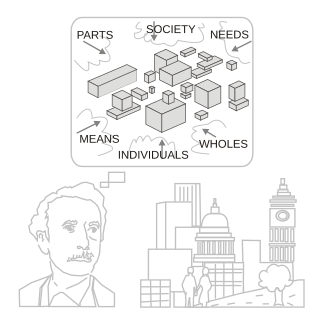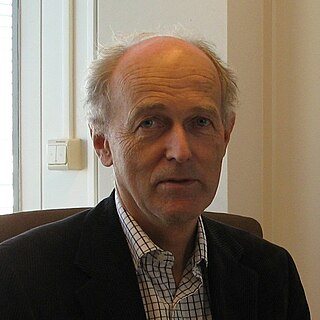Related Research Articles
Software development is the process of conceiving, specifying, designing, programming, documenting, testing, and bug fixing involved in creating and maintaining applications, frameworks, or other software components. Software development is a process of writing and maintaining the source code, but in a broader sense, it includes all that is involved between the conception of the desired software through to the final manifestation of the software, sometimes in a planned and structured process. Therefore, software development may include research, new development, prototyping, modification, reuse, re-engineering, maintenance, or any other activities that result in software products.
Peter Checkland is a British management scientist and emeritus professor of systems at Lancaster University. He is the developer of soft systems methodology (SSM): a methodology based on a way of systems thinking systems practice. Systems practice is the idea that real-world problems could be improved with solutions that were both systematically desirable and culturally feasible. In an important way his work preceded data science and change management disciplines in the next century.

Systems science is an interdisciplinary field that studies the nature of systems—from simple to complex—in nature, society, cognition, engineering, technology and science itself. To systems scientists, the world can be understood as a system of systems. The field aims to develop interdisciplinary foundations that are applicable in a variety of areas, such as psychology, biology, medicine, communication, business management, technology, computer science, engineering, and social sciences.
System of systems is a collection of task-oriented or dedicated systems that pool their resources and capabilities together to create a new, more complex system which offers more functionality and performance than simply the sum of the constituent systems. Currently, systems of systems is a critical research discipline for which frames of reference, thought processes, quantitative analysis, tools, and design methods are incomplete. The methodology for defining, abstracting, modeling, and analyzing system of systems problems is typically referred to as system of systems engineering.
Soft systems methodology (SSM) is an approach to organizational process modelling and it can be used both for general problem solving and in the management of change. It was developed in England by academics at the Lancaster University Systems Department through a ten-year action research program.

CIMOSA, standing for "Computer Integrated Manufacturing Open System Architecture", is an enterprise modeling framework, which aims to support the enterprise integration of machines, computers and people. The framework is based on the system life cycle concept, and offers a modelling language, methodology and supporting technology to support these goals.

Enterprise integration is a technical field of enterprise architecture, which is focused on the study of topics such as system interconnection, electronic data interchange, product data exchange and distributed computing environments.
A conceptual model is a representation of a system, made of the composition of concepts which are used to help people know, understand, or simulate a subject the model represents. It is also a set of concepts. In contrast, physical models are physical objects; for example, a toy model which may be assembled, and may be made to work like the object it represents.

Enterprise modelling is the abstract representation, description and definition of the structure, processes, information and resources of an identifiable business, government body, or other large organization.
A system is a group of interacting or interrelated entities that form a unified whole. A system, surrounded and influenced by its environment, is described by its boundaries, structure and purpose and expressed in its functioning. Systems are the subjects of study of systems theory.
Luc Hoebeke is a Belgian consultant, author and lecturer in the field of self-organization, innovation processes and human activity systems, known for his book Making Work Systems Better: A Practitioner's Reflections (1994).

Jean Leonardus Gerardus (Jan) Dietz is a Dutch Information systems researcher, Emeritus Professor of Information Systems Design, and part-time Professor of Enterprise Engineering at the Delft University of Technology, known for the development of the Design & Engineering Methodology for Organizations. and his work on enterprise ontology.
Enterprise engineering is the body of knowledge, principles, and practices used to design all or part of an enterprise. An enterprise is a complex socio-technical system that comprises people, information, and technology that interact with each other and their environment in support of a common mission. One definition is: "an enterprise life-cycle oriented discipline for the identification, design, and implementation of enterprises and their continuous evolution", supported by enterprise modelling. The discipline examines each aspect of the enterprise, including business processes, information flows, material flows, and organizational structure. Enterprise engineering may focus on the design of the enterprise as a whole, or on the design and integration of certain business components.

A view model or viewpoints framework in systems engineering, software engineering, and enterprise engineering is a framework which defines a coherent set of views to be used in the construction of a system architecture, software architecture, or enterprise architecture. A view is a representation of a whole system from the perspective of a related set of concerns.

Anthony John Moses is a Welsh scientist, researcher and professor, former director of Wolfson Centre for Magnetics.

Generalised Enterprise Reference Architecture and Methodology (GERAM) is a generalised enterprise architecture framework for enterprise integration and business process engineering. It identifies the set of components recommended for use in enterprise engineering.
Ronald K. (Ron) Stamper is a British computer scientist, formerly a researcher in the LSE and emeritus professor at the University of Twente, known for his pioneering work in Organisational semiotics, and the creation of the MEASUR methodology and the SEDITA framework.
In software engineering, a software development process is the process of dividing software development work into distinct phases to improve design, product management, and project management. It is also known as a software development life cycle (SDLC). The methodology may include the pre-definition of specific deliverables and artifacts that are created and completed by a project team to develop or maintain an application.
Logico-linguistic modeling is a method for building knowledge-based systems with a learning capability using conceptual models from soft systems methodology, modal predicate logic, and logic programming languages such as Prolog.


